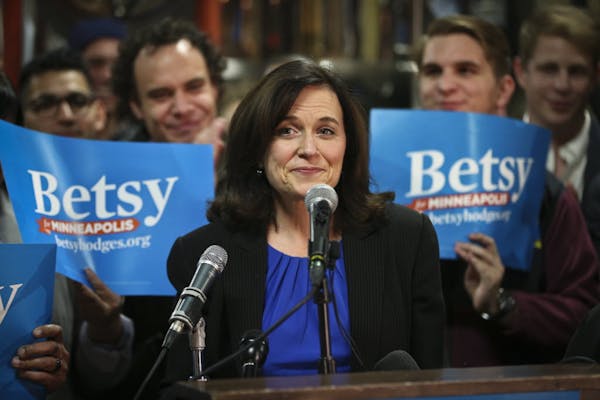She's a fan of NASCAR who wears Wonder Woman T-shirts beneath blazers, a progressive activist with a penchant for wading into messy political issues at City Hall, and a DFLer whose bid for mayor was opposed by the establishment of her party.
Betsy Hodges, the presumptive next mayor of Minneapolis, is a hard-nosed budget wonk driven by her concern for the less fortunate. She is sharp and witty in private, but careful and restrained in the public eye.
"Thank you so much to the people of Minneapolis for the faith and the trust that you have placed in me to lead this city into the future," Hodges told a rally of supporters Wednesday night at a brewery in northeast Minneapolis. Earlier in the evening, her lead opponent, Mark Andrew, announced that he had called to congratulate her, even though the city's count of ranked-choice ballots continued into the night without an official winner.
Her success was due in large part to a strong field operation, which scattered dozens of volunteers through one crucial neighborhood after another. In the final days of the campaign, it allowed them to quickly inform voters about important developments in the race.
"The number of actual conversations we had with actual voters is astounding," Hodges said.
The Hodges campaign hired its field director in February and doubled down on the operation after realizing that voters were not responding to mail or television ads. Into the final stretch, volunteers were sent throughout the city knocking on specific doors while others, including Hodges' mother, were working the phones and having long — sometimes nine-minute — conversations with potential supporters.
The number of undecided voters remained high until the final days of the campaign, indicating that the support would break late in the race. "What we wanted to make sure was that we were the first people to talk to somebody and we were the last people to talk to somebody," Hodges campaign manager Andy O'Leary said.
O'Leary said that the campaign's projected support was strong but improved as soon as Hodges received the Star Tribune editorial page's endorsement in late October. The endorsement was highlighted on literature and became a talking point of volunteers on doorsteps over the weekend.
In the end, Hodges took nearly every precinct in the city, except for several along Franklin Avenue and in the North Side.
Even her closest opponent praised Hodges' campaign.
"We ran an incredible campaign, but in the end we just couldn't shake her," Andrew wrote in a message to his backers. "Betsy was tenacious, determined and she peaked at the right time."
The coming challenge
But in two months, Hodges' vision of ending persistent inequalities and helping the city's population grow will be put to the test, as she tries to sell her agenda to a reconstituted City Council with seven new members and two incumbents who supported Andrew.
She was a relative unknown a little over a decade ago when stadium politics launched her into the spotlight as part of a group examining the funding of a Twins ballpark.
Now Hodges, 44, who grew up in Minnetonka and who closely allied herself with outgoing Mayor R.T. Rybak during eight years on the City Council, is poised to lead the city after running on her record as a shaper of budgets.
Politically, some of her biggest fights have been over pension reform and firefighter staffing. On the campaign trail, she painted herself as a tight Rybak ally who could largely continue his policies.
Whether she will wear her eccentricities on her sleeve as a politician, as Rybak has, remains to be seen. She has a cat named after the skyscraper from the movie "Die Hard" and wrote an unpublished young-adult novel based on Jane Austen's "Persuasion."
Hodges' apparent victory comes after a political career spent in the trenches of progressive fights. She cut her teeth in local politics in the late 1990s as an activist for Progressive Minnesota, now TakeAction Minnesota, working on education referendums and opposing stadium subsidies. She later worked as an aide to Hennepin County Commissioner Gail Dorfman — now a supporter — and as development director at a nonprofit.
TakeAction helped propel her at the polls this week, in addition to such groups as the Service Employees International Union and womenwinning.
Sen. Scott Dibble, DFL-Minneapolis, encouraged her to run for public office before she was first elected to the council in 2005, representing southwest Minneapolis.
Some of her initial high-profile work on the council included reining in "monster houses" with new rules, helping merge the city's libraries into the county system and imposing new regulations on circuses. She later became the public spokeswoman for pension reform and heavily scrutinized firefighters' use of sick time.
Looking ahead to growth
Because of Rybak's policies, Hodges stands to inherit a city very different from what he encountered when he entered City Hall as a political newbie in 2001. The debt-ridden budget has been largely righted, and attention is now focused on growth.
To help accommodate her goal of increasing the city's population to 500,000 people, she has supported a plan to build a $200 million, 3.2-mile streetcar line along Nicollet Avenue. She has also called for police officers to wear body cameras, despite public hesitance from the department. Her "Cradle-to-K" plan would, among other things, expand the city's Healthy Start program, aiding low-income parents before and after childbirth.
Reducing inequality along racial and other lines across the city was a primary message of her campaign, however.
"When we are all together, we will have a future that is far greater than whatever we could do separate from one another," Hodges said Wednesday evening. "Together we are bigger than the sum of our parts."
Eric Roper • 612-673-1732
Twitter: @StribRoper
The Latest | Trump prosecutors claw back at defense's portrait of tabloid deal

